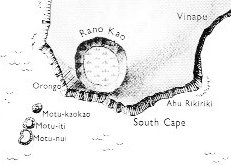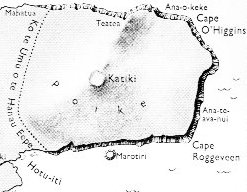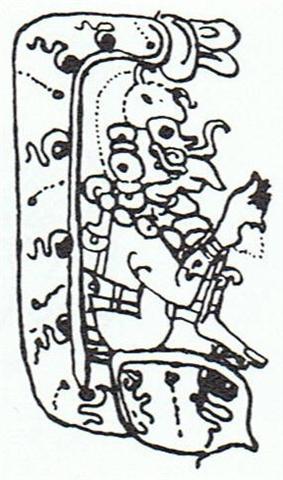3. The Black Rat, Te Kioe Uri, is located close to Rano Kau at the beginning of the dark southern coast, and it was the 4th kuhane station on the mainland:
Moon moves along the southern coast from west to east giving time along her way. Her final station could be Maunga Teatea:
If Te Kioe Uri corresponds to Metoro's kiore, then it is reasonable to find him at the back side of the land (henua):
I suspect the creators of Manuscript E intentionally changed kiore to kioe which could mean 'it is Kio' (Kio-e).
The Hakakio festival of thanksgiving took place in the 4th month, Tangaroa Uri. Maybe it was because the beautiful land once again was rising from the sea (referring to what happens in the spring sky). But kio is a word which seems to indicate the opposite situation, when light is extinguished, when Sun is hiding in a cave. We remember the Rain God down in his hole - like a rat - beyond midsummer:
Ure Honu discovered a rat in the middle of his banana plantation (suggesting autumn equinox): ... Another year passed, and a man by the name of Ure Honu went to work in his banana plantation. He went and came to the last part, to the 'head' (i.e., the upper part of the banana plantation), to the end of the banana plantation. The sun was standing just right for Ure Honu to clean out the weeds from the banana plantation. On the first day he hoed the weeds. That went on all day, and then evening came. Suddenly a rat came from the middle of the banana plantation. Ure Honu saw it and ran after it. But it disappeared and he could not catch it. On the second day of hoeing, the same thing happened with the rat. It ran away, and he could not catch it. On the third day, he reached the 'head' of the bananas and finished the work in the plantation. Again the rat ran away, and Ure Honu followed it. It ran and slipped into the hole of a stone. He poked after it, lifted up the stone, and saw that the skull was (in the hole) of the stone. (The rat was) a spirit of the skull (he kuhane o te puoko) ... The rat fled into a hole and it was evening, the time when Sun goes down in the west. We are not in spring but in autumn, at the beginning of the winter season. The weeding of a banana plantation (with the soft bananas formed like Moon crescents) sounds like an allusion to Roto Iri Are, the kuhane station after Hatinga Te Kohe where the ruler's bamboo staff was broken. Maybe because it was harvest time. Iri-are is a kind of sea-weed, and beyond Jupiter comes Venus. Galileo discovered that also Venus has crescents.
On Chatham Islands the 9th son of Tu was Io, a name which I connect with Kio. In other words, we can suspect the Black Rat to be Jupiter, positioned at ¾ of the calendar cycle. Beyond comes the sea (winter). However, there were 19 and not 12 sons of Tu:
¾ * 365 = 274 and 399 - 274 = 125, like a cube of 'fire' for Saturn. The 4th dark quarter of the cycle belongs to Saturn. Venus apparently is in the first part of this cube. 10 * 28 = 280 is my guess above for the last day of the 10th son Io-rangi. Jupiter is Father Light up in the sky (ragi). The previous son of Tu was Io (not up in the sky). We can compare with Akahanga, the 9th kuhane station, where both Hotu Matua and his queen were buried, like the seeds of next generation. Matua means father, but also the part from which it all will start anew:
Then comes Wai-o-rangi (presumably indicating winter according to the signs in the sky). Day number 266 should be at autum equinox and 266 + 8 = 274 = ¾ * 365. The rule of Io evidently could end where summer ends, maybe at the end of the 9th glyph line of the G text. In line b2 winter could begin, in the month of Io-rangi (Hatinga Te Kohe). Io would then be the light down in the earth - Mercury, Akahanga - i.e. the Black Rat down in his hole.
|
|||||||||||||||||||||||||||||||||||||||||||||||||||||||||||||||||||||||||||||||||||||||||||||||||||||||||||||||||||||||||||||||||||||||||||||||||||||||

















